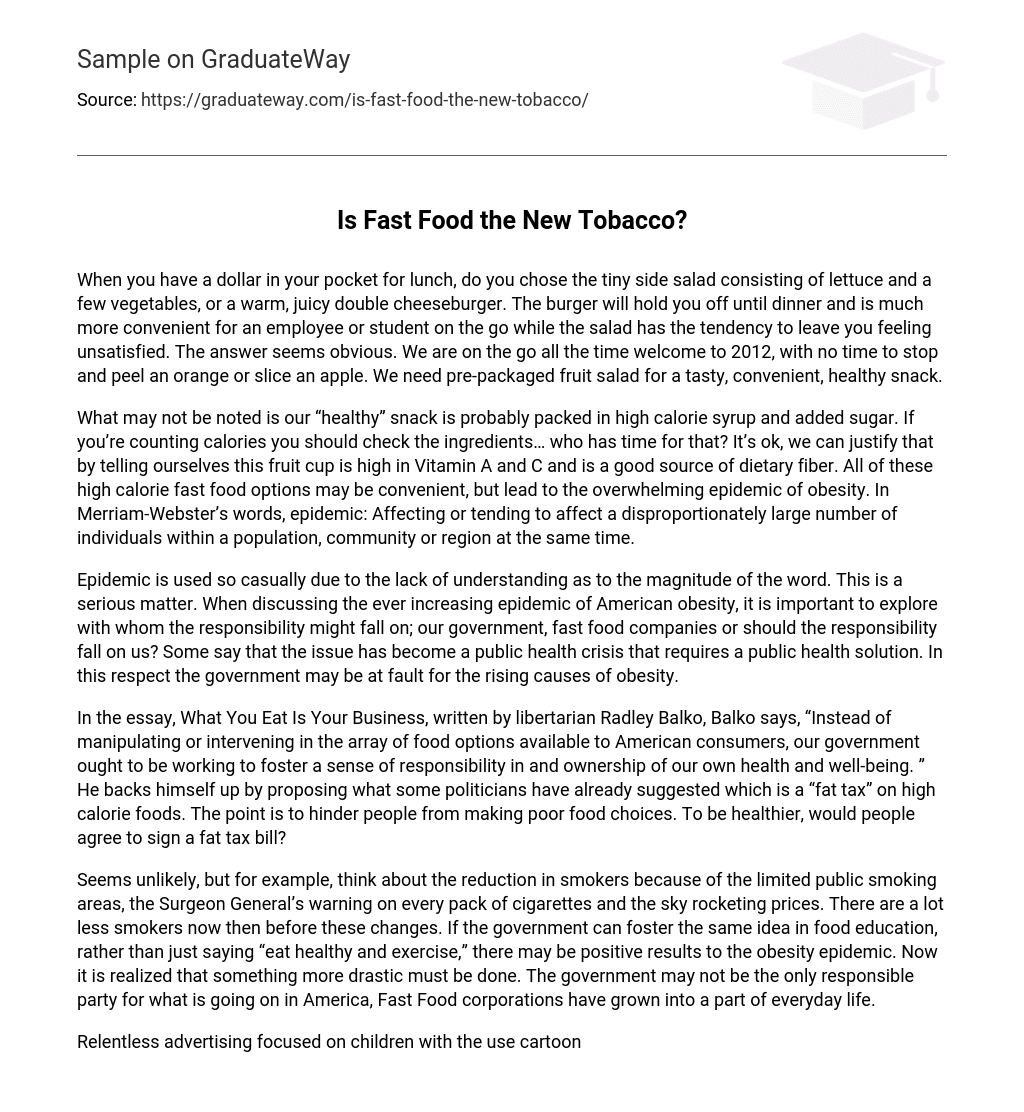In today’s fast-paced world, individuals often have to decide between a small side salad or a flavorful double cheeseburger for lunch. Typically, people opt for the burger due to its filling nature and convenience. Conversely, the salad tends to be unsatisfying and leaves individuals feeling unfulfilled. Additionally, there is limited time available for preparing nutritious snacks such as peeling an orange or slicing an apple while constantly on the move. Consequently, pre-packaged fruit salad becomes an ideal choice for a delicious, convenient, and wholesome snack.
It can be challenging to check the ingredients in our “healthy” snack, like high-calorie syrup and added sugar, if we are watching our calorie intake. However, many of us still consume these fruit cups because they provide Vitamin A and C, as well as dietary fiber. Regrettably, despite their convenience, these fast food options contribute to the epidemic of obesity that affects a significant portion of the population simultaneously according to Merriam-Webster’s definition.
The term “epidemic” is often used without fully understanding its significance, but it is crucial to acknowledge the gravity of the situation. When discussing the growing epidemic of American obesity, it is important to identify who should be held responsible: the government, fast food companies, or individuals themselves? Some argue that this issue has reached a level where it can be considered a public health crisis and requires an appropriate solution. Therefore, there may be valid reasons for attributing responsibility to the government for their contribution to the increase in obesity rates.
In his essay “What You Eat Is Your Business,” libertarian Radley Balko argues for prioritizing personal responsibility over government intervention in health and well-being. Balko suggests implementing a “fat tax” on high-calorie foods, an idea already proposed by politicians, to discourage unhealthy food choices. Would people support a fat tax bill to improve their own health?
It may seem unlikely, but consider the decrease in smokers due to limited public smoking areas, the Surgeon General’s warning on cigarette packs, and increasing prices. These changes have resulted in fewer smokers compared to before. If the government can apply a similar approach to food education, rather than simply advising to “eat healthy and exercise,” there could be positive outcomes in addressing the obesity epidemic. It is now recognized that more drastic measures are necessary. The responsibility for the current situation in America cannot solely be attributed to the government, as fast food corporations have become ingrained in everyday life.
Relentless advertising targeting children uses cartoon characters, larger portions or extra sizes to appeal to people. Yves Engler, author of Obesity: Much of the Responsibility Lies with Corporations, highlights that it is not only fast food restaurants that promote unhealthy products, but also soft drink companies that contribute money to financially strained schools to advertise their high-calorie soda on school televisions. This strategy primarily targets young children who then influence their parents to purchase these products.
Engler suggests a solution for the growing problem of childhood obesity. He first emphasizes the need to remove vending machines from schools and recommends investing more resources in the physical education department to promote greater physical activity and support children’s sports. In a capitalist society, fast food companies are increasing their profits by offering products in schools and using aggressive advertising techniques targeted at children. These actions are negatively impacting the health of our youth and exposing them to potential diseases and health issues before they become adults.
There is an argument to be made that we bear responsibility for obesity-related illnesses, with a condition attached. Obesity is a problem that affects both society as a whole and individuals who make certain choices. Numerous individuals engage in multitasking while eating or succumb to cravings brought on by television advertisements. Furthermore, they may find themselves lacking the time and energy required for regular exercise due to fatigue or hectic schedules. Regrettably, these decisions can result in health issues and diseases for those who consume fast food daily.
Radley Balko argues that the absence of higher insurance premiums for obese individuals eliminates any financial accountability for consumers. He contends that if the government covers the costs of anti-cholesterol medication, there is no motivation for individuals to make healthier dietary choices. Balko believes that making nutritional labels more abundant and descriptive would enhance understanding and potentially mitigate the future consequences of societal health and well-being. While some people blame food corporations for effectively marketing and promoting unhealthy products, others assert that personal responsibility should be the main focus, or argue that the government should offer consumers healthier alternatives and promote lifestyle changes. The responsibility for the American obesity epidemic is subject to multiple debates, but ultimately requires collaboration among the government, fast food corporations, and consumers to achieve a reasonable solution.





